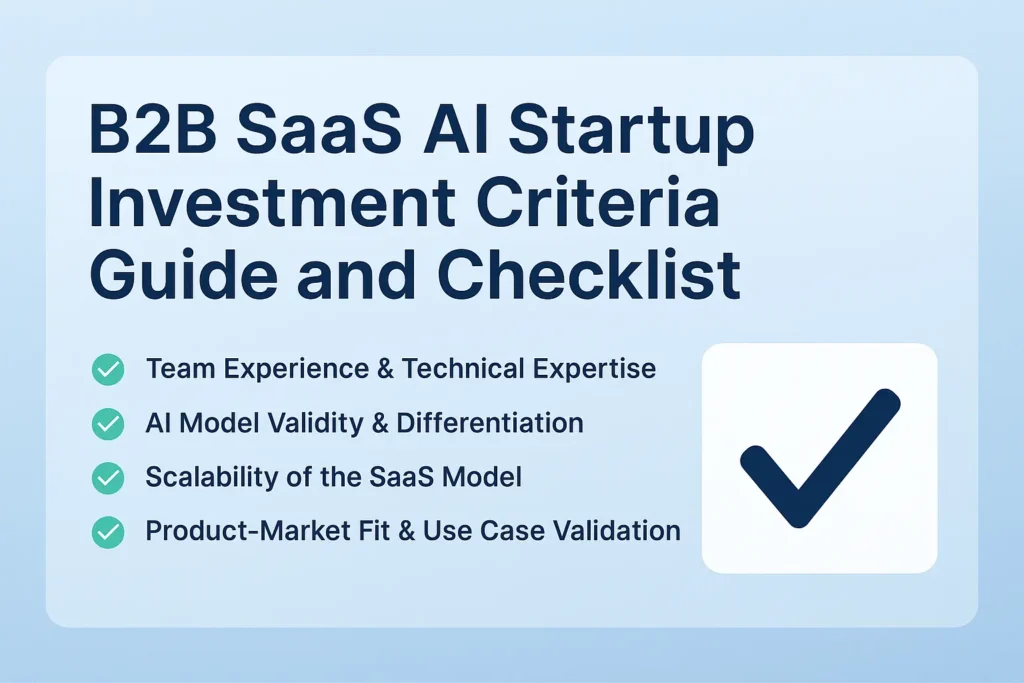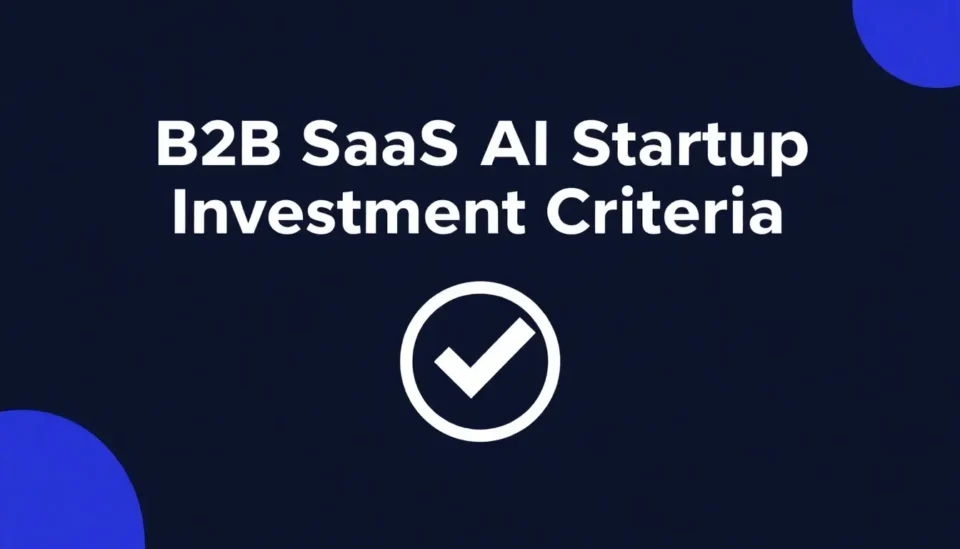As the B2B SaaS and AI sectors continue to converge, the investment landscape is shifting rapidly. According to recent data from Economictimes, the B2B SaaS AI market is projected to grow to $55 billion by 2027, driven by enterprises adopting AI to optimize operations, improve customer engagement, and unlock data-driven insights. This growth has attracted significant attention from venture capitalists (VCs), angel investors, and corporate investors, all of whom are seeking the next high-growth opportunity in this space.
However, with the influx of capital also comes increased scrutiny. Investors are no longer just funding AI “coolness” or SaaS models with vague promises. They are looking for scalable, defensible, and data-driven businesses that can prove their value in the real world.
In this article, we’ll explore the key investment criteria that define a compelling B2B SaaS AI startup, the red flags to avoid, and what it takes to build an investor-ready business in this competitive space.
What Makes B2B SaaS AI Startups Unique?
A B2B SaaS AI startup is a company that builds and delivers software-as-a-service (SaaS) platforms enhanced by artificial intelligence (AI) to solve specific business problems. Unlike traditional SaaS, these startups often rely on proprietary data pipelines, machine learning models, and automated decision-making to deliver value.
Key Characteristics:
- AI as a Core Feature or Core Product: AI is either the backbone of the solution or a critical enhancement.
- Recurring Revenue + Data Moat: SaaS provides predictable revenue, while AI builds a data-driven moat that becomes more valuable over time.
- Longer Sales Cycles: B2B buyers require deep validation, often involving proof of concept (POC), pilot programs, and multi-departmental sign-off.
- High Retention Potential: When AI adds real business value, churn rates can be significantly lower than traditional SaaS.
What is a B2B SaaS AI startup?
A B2B SaaS AI startup is a company that uses AI to deliver software-as-a-service solutions to other businesses. These startups combine the scalability of SaaS with the intelligence of AI to solve real-world business problems, often building a data moat that improves over time.
Investment Criteria for B2B SaaS AI Startups
Investors evaluate B2B SaaS AI startups using a combination of technical, business, and market criteria. Here are the key factors that separate the winners from the rest.
a. Team Experience & Technical Expertise
- Founders with Deep Domain Knowledge: A mix of AI/ML engineers and SaaS go-to-market (GTM) experts is ideal.
- Track Record of Execution: Past exits, published research, or experience in relevant AI/SaaS companies is a strong signal.
- Scalability Mindset: The team must be able to scale not just the product, but also the sales, support, and infrastructure.
“We look for teams that can build and operate at scale. In AI, the difference between a prototype and a product is often a 10x increase in compute and data needs.” – Sarah Tavel, General Partner at a16z.
b. AI Model Validity & Differentiation
- Proprietary Algorithms vs. Open Source: While open-source models are useful, proprietary AI is a strong differentiator.
- Training Data Quality: Clean, labeled, and structured data is essential for model performance.
- Model Performance Metrics: Investors care about precision, recall, bias mitigation, and the ability to explain model decisions (especially in regulated industries).
c. Scalability of the SaaS Model
- Multi-tenancy & API Integrations: A true SaaS platform should be able to serve multiple customers efficiently.
- Infrastructure Readiness: Use of cloud-native tools like Kubernetes, Docker, and serverless architectures is a plus.
- AI Scalability: Can the model handle 10x more customers without performance degradation?
d. Product-Market Fit & Use Case Validation
- Solving Real B2B Pain Points: Investors want to see that the AI is solving a specific, urgent problem for enterprise clients.
- Early Traction: Proof of concept (POC), pilot programs, and first 10 customers are critical for validating the solution.
- Customer Feedback Loop: Is the product improving based on real-world usage?
e. Unit Economics & SaaS Metrics
- CAC vs LTV: A high LTV:CAC ratio (ideally 3:1 or higher) is essential.
- Churn Rate: B2B SaaS AI startups should aim for <5% monthly churn.
- MRR/ARR: A clear path to predictable revenue is key.
- AI-Related Costs: Investors also evaluate compute, data labeling, and model retraining costs.
f. Data Strategy & Moat
- Proprietary Data: The more proprietary and high-quality the data, the stronger the moat.
- Data Compliance: GDPR, HIPAA, and other regulations must be respected.
- Feedback Loop: The ability to retrain models with user data creates a self-reinforcing advantage.
Check the: Best 4 AI Tools for Predictive Analytics
g. Go-to-Market Strategy
- Enterprise Sales Readiness: Can the team sell to C-suite buyers and navigate procurement?
- PLG vs. Partner Sales: Product-led growth (PLG) is gaining traction, but many AI SaaS products still require inside or enterprise sales.
- Customer Onboarding: A seamless onboarding experience is critical for retention.
h. Exit Potential & Market Size
- TAM/SAM/SOM Analysis: A large total addressable market (TAM) is a must-have.
- Comparable Exits: Investors look for previous acquisitions or IPOs in the space as a reference.
- Strategic Acquirers: Potential buyers include cloud providers, enterprise software giants, and industry-specific players.
Red Flags Investors Watch Out For
Even the most promising AI SaaS startups can fail due to avoidable mistakes. Here are the top red flags investors watch for:
- Model Generalization Problems: AI that works in a lab but fails in the real world.
- Black Box AI with No Explainability: Especially in regulated industries like healthcare or finance.
- High Burn Rate with No Revenue Visibility: Burning cash without a clear path to revenue is a red flag.
- No Clear GTM or ICP: Lack of a defined customer profile and sales strategy.
B2B SaaS AI Startup Investment Criteria Checklist
| Criteria | What Investors Want | Red Flags |
| Team | Deep tech + SaaS GTM | Inexperienced in AI deployment |
| AI Model | Proprietary, explainable | Generic, untested model |
| Metrics | Positive unit economics | High churn, unclear CAC |
| Data | Owns + complies | Data dependency / legal risks |

Real-World Examples of Funded B2B SaaS AI Startups
- Gong.io (Revenue Intelligence): Uses AI to analyze sales calls and improve performance. Raised $1.5B in total funding.
- Snyk (Developer Security): AI-powered tool for code vulnerability detection. Acquired by Cisco for $4.7B in 2023.
- Observe.AI (Contact Center AI): Analyzes customer service calls for insights. Raised $235M to date.
These startups exemplify how combining SaaS scalability with AI intelligence can attract major investment and scale rapidly.
Expert Quotes from VCs and Analysts
“The best B2B SaaS AI startups are those that combine strong product-market fit with defensible data moats. AI is not a differentiator if it’s not tied to a real business outcome.” – Vijay Pande, General Partner at Andreessen Horowitz.
“We’re seeing a lot of noise in the AI space, but the ones that stand out are the ones that are already solving real problems for real customers.” – Anand Agarawala, General Partner at Sequoia Capital.
Final Thoughts
B2B SaaS AI startups represent a high-risk, high-reward opportunity for investors. While the potential is massive, success is not guaranteed. Founders must focus on solving real business problems, building defensible AI models, and delivering predictable, recurring revenue.
For investors, the key is to identify startups that have the right team, product, and strategy to scale. Those that can do so will not only attract capital but also become the next generation of enterprise software leaders.
In a market where AI is no longer a novelty but a necessity, the winners will be those who build sustainable, data-driven, and customer-focused SaaS platforms.
FAQs
A strong team, real PMF, scalable tech, proprietary AI models, solid SaaS metrics, and data compliance.
By landing early enterprise customers, showing high usage and retention, and solving a clear business pain point.
Proprietary data fuels unique models, builds moats, and reduces competition from copycats.
AI SaaS has higher upfront R&D and data costs but offers greater automation, defensibility, and long-term value.


